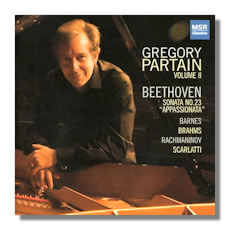
The Internet's Premier Classical Music Source
Related Links
-
Beethoven Reviews
Brahms Reviews
Rachmaninoff Reviews
D. Scarlatti Reviews - Latest Reviews
- More Reviews
-
By Composer
-
Collections
DVD & Blu-ray
Books
Concert Reviews
Articles/Interviews
Software
Audio
Search Amazon
Recommended Links
Site News
 CD Review
CD Review
Piano Recital, Volume II

- Sergei Rachmaninoff:
- Prelude in B Flat Major, Op. 23/3
- Prelude in G Sharp minor, Op. 32/12
- Prelude in G Major, Op. 32/6
- Domenico Scarlatti:
- Sonata in D Major, K. 96
- Sonata in F minor, K. 481
- Sonata in A Major, K. 39
- Johannes Brahms: Variations on an Original Theme, Op. 21/1
- Larry Barnes: Toccata: Act of War
- Ludwig van Beethoven: Sonata #23 in F minor "Appassionata", Op. 57
Gregory Partain, piano
MSR Classics MS1231 75:56
Summary for the Busy Executive: Couldn't help myself.
For a while, I argued with myself as to whether I wanted to review this disc or not. An endorsement from Terry Teachout kept me listening. Even now, I view Partain's playing with ambivalence. I certainly don't question his technique. This guy's got fingers. The Rachmaninoff and Scarlatti are as clean as you'll hear.
On the other hand, I can't say that the Rachmaninoff goes anywhere. In his liner notes, Partain cites the composer's remark that every piece has one climactic point, "upon which the entire structure depended." I miss that sense of build, break, and fall-away in Partain's accounts. In the Scarlatti, Partain gives you diamond-like runs. Horowitz for me remains the standard of Scarlatti on the piano, not just for his incredible technique, but because of the sense of fantasy and eccentricity, as if Scarlatti and Horowitz temporarily shared one mind. Partain plays more than capably but lacks Horowitz's extraordinary range of color.
I admit the Brahms Variations on an Original Theme is a tough piece, a variation set for most of its length and an extended fantasia at the end, where the composer throws away his strict adherence to the thematic structure and essentially riffs. Furthermore, the piece strikes me as one of Brahms' overstuffed horsehair sofas – as if he crams as much as he can into the work, which gets pretty thick in places. Partain manages to keep the textures clear but misses the larger architecture of the piece. Even more worrisome, I don't particularly like his line, the sense of forward motion as he plays. The music tends to come in stabs and bursts, emphasizing the percussive rather than the singing qualities of the instrument.
Larry Barnes' Toccata: Act of War was actually conceived before September 11, 2001, and finished after. I hesitate to read anything into the music itself or even the title. I hear in it great debts to Prokofiev and especially to the finale of Barber's piano concerto. Barnes has composed a well-written piece but fails to overwhelm the listener, which I think a required goal for a toccata. The overall shape fails to generate drama. I never once was particularly surprised by anything it said.
As you might imagine, I wasn't looking forward to the Beethoven. Yet, I felt I had to listen, out of a sense of duty. This time, duty rewarded me. Partain, without any perceptible change in his playing, has recorded one of the great "Appassionatas." Some of the interpretive details for me bordered on the bizarre, particularly the taffy-pulling of the rhythm in spots, but as the performance went on, they became part of a whole. The pianist who comes closest (although not in Beethoven) to Partain is Glenn Gould. That is, he confronts you with a view of the work far from any you've heard, and yet – whether you agree with it or not – you must admit its stunning intellectual consistency. Partain brings an intricate level of detail into a coherent whole. In the first movement exposition, for example, a downward run in the bass shifts to the top voice in the recapitulation. Partain joins dozens of such details over long spans. Yet the reading isn't all head, either. The music loses nothing in the dramatic sweep we expect of it.
This CD has garnered some nice reviews. The Beethoven alone justifies them. I'm perfectly willing to admit that my coolness toward the rest comes down to my quirks. Partain also owes props to the recording engineer and the guy who tuned the piano, the sound of the instrument is that gorgeous.
Copyright © 2009, Steve Schwartz




















